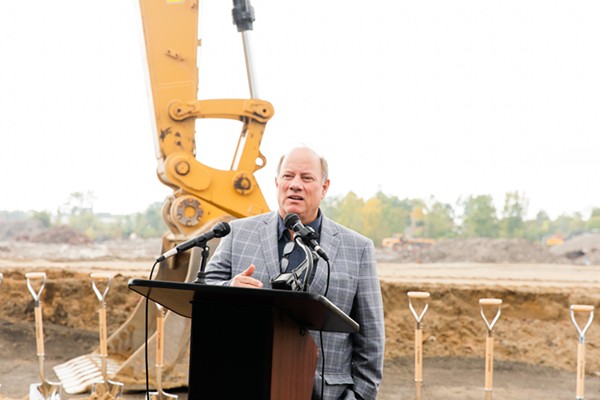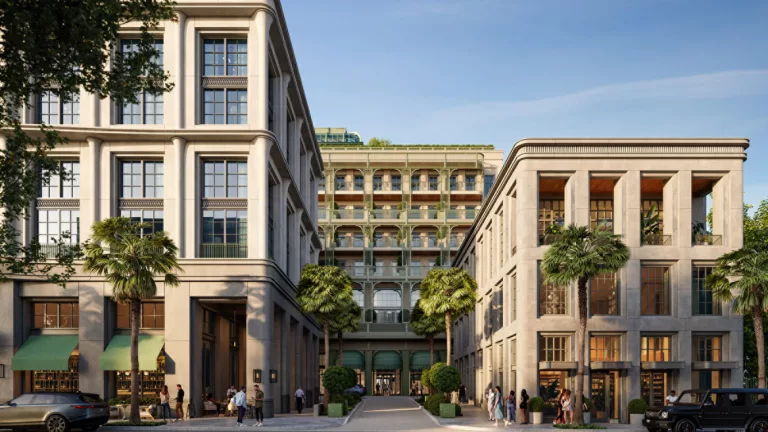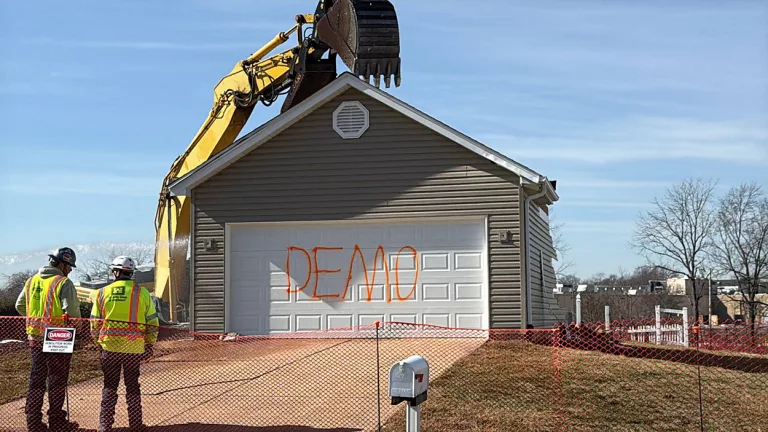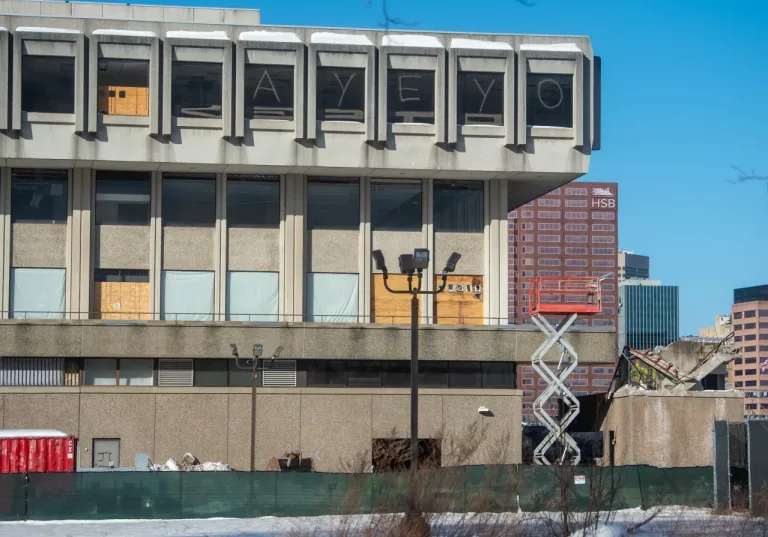
The City of Detroit and Mayor Mike Duggan’s administration have announced a redevelopment scheme that is poised to destroy yet another iconic piece of our industrial and architectural history for minimal economic gain. Under the guise of 150 construction jobs that will undoubtedly go to suburbanites and the potential for an auto-supplier tenant that may bring 300 measly full-time positions, the former American Motors headquarters on Plymouth Road is set to be demolished and replaced by another industrial development that looks like it belongs in Mike’s hometown of Livonia. “One by one, we are taking down the massive vacant buildings that for too long have been a drain on our neighborhoods and our city’s image and putting something new in their place,” Duggan said at a presser in front of the structure. The destructive demolition and environmental degradation that have characterized almost all of Duggan’s projects in the city should be understood as his failure to attract high-quality development to our neighborhoods, not a victory for Detroiters. The cheap and shortsighted vision that he’s laid out for our neighborhoods and the economic chances of Detroit residents has already become a drain on our city’s image and future.
For almost a decade, this mayor has shown a sustained commitment to the underdevelopment of sites like these as his main economic development tool. By demolishing our city’s architectural gems and replacing them with cookie-cutter, polluting industrial sites, we further devalue the places and people that make our city special. Through demolition, we completely eliminate the chance for Detroiters to imagine unique futures based on adaptive use models that have proven successful here and elsewhere. By replacing them with the types of jobs the Duggan administration has attracted, the city is actively tying Black Detroiters back to the same volatile manufacturing economic cycle that has always disproportionately impacted our households and wealth. This was the case with the FCA/ Stellantis expansion in 2016, Flex-N-Gate’s entry to the city in 2018, the 2021 demolition of the historic Cadillac Stamping plant by the same developer slated for the American Motors site, and the planned demolition of the State Fair Coliseum for Amazon. Each received public dollars in the form of tax abatements, brownfield incentives, or city-owned land. Each was justified by jobs numbers that are never guaranteed and rarely meet benchmarks, and each has or will expose more of our neighborhoods to pollution, truck traffic, and the associated health impacts. The asthma rate in the impact area of FCA Stellantis’ Detroit Assembly Complex is three times the statewide and twice the citywide average.
While Duggan has touted these as opportunities that are creating middle-income jobs, Detroiters working at Amazon and Flex-N-Gate have reported abysmal working conditions and wages that keep middle-class life out of reach. State and local officials have bolstered this with an unwavering delusion that auto-manufacturing jobs are a sustainable base for our economic future. Our fruitless capitulation to the auto industry still dominates the economic agenda and is limiting our chance of imagining a better economic and mobility future for our city and state. The ghost of Poletown, the 4,200-person neighborhood that was leveled for a GM plant that housed about 1,800 jobs as of 2017, should serve as a stark warning against trading in neighborhoods for jobs the auto industry has never hesitated to move elsewhere. These projects continue to threaten the very middle-class “neighborhoods of strength” the mayor claims to prioritize for quality of life improvements.
Duggan has led an era of incredible inequality in Detroit. Our city’s median income is still half that of the rest of the region, increasing 60% for white residents and just 8% for Black residents between 2010 and 2019. Black Detroiters continue to be dispossessed of homes through tax over-assessment, foreclosure, and rental scams while the city rewards speculators and assembles land for corporations with billions. Redevelopment schemes like what’s being proposed at the American Motors headquarters will only recreate and solidify patterns of inequality and continue to make Detroit and its communities vulnerable to extractive developments predicated on the exploitation of a historically marginalized labor pool. The city’s nominal prosperity has already begun to indicate a more segregated city that is still hemorrhaging middle-class Black residents; this will add to that burden.
We must demand futures for our special automotive industrial sites that realize their full potential for an egalitarian future in Detroit. Detroiters deserve and want to be able to save the priceless structures corporations left to rot in our neighborhoods and create unique, bold spaces for our future. We have borne the full burden of the city’s decline and are reaping a fraction of the benefits associated with its so-called revitalization. We should be using brownfield dollars for stabilization instead of demolition. We should be giving Detroiters the skills they need to assess, stabilize, and reimagine the iconic structures that once housed our industrial might and fueled the growth of our city. We should be doing all we can to savor unique opportunities for our city and its residents and spreading benefits to as many Detroiters as possible, even if it’s incremental and complex. These sites should be places where we create new industries and ideas instead of chasing the high of an industry that will never return at a scale that will sustain us.
We must resist the limited vision of our city the mayor continues to advocate for. Detroiters deserve much more than having to choose between the city’s neglect and destruction of our irreplaceable urban fabric and suburban-style factories that threaten our quality of life. A third term of his approach will be a devastating loss and a squandering of the biggest opportunity we’ve had to reimagine Detroit’s future in a lifetime. If we do not resist and advocate for alternatives to this path, we will look back and be sorry for how much of our city we’ve destroyed for this mayor’s predatory get-jobs-quick schemes. There may not be much left of what makes Detroit special by 2026.
Paul Jones III is a native Detroiter and Master of Urban and Regional Planning candidate at the University of Michigan’s Taubman College. He has a B.A. in Urban Studies from Wayne State University, Detroit city government experience in the planning department and mayor’s office from 2016-2020, and a passion for Detroit’s rich history. He also serves as board vice president of Transportation Riders United, a local transportation advocacy organization. The article reflects his views as an urbanist and advocates for racial justice in issues of urban planning and the built environment.
Stay connected with Detroit Metro Times




